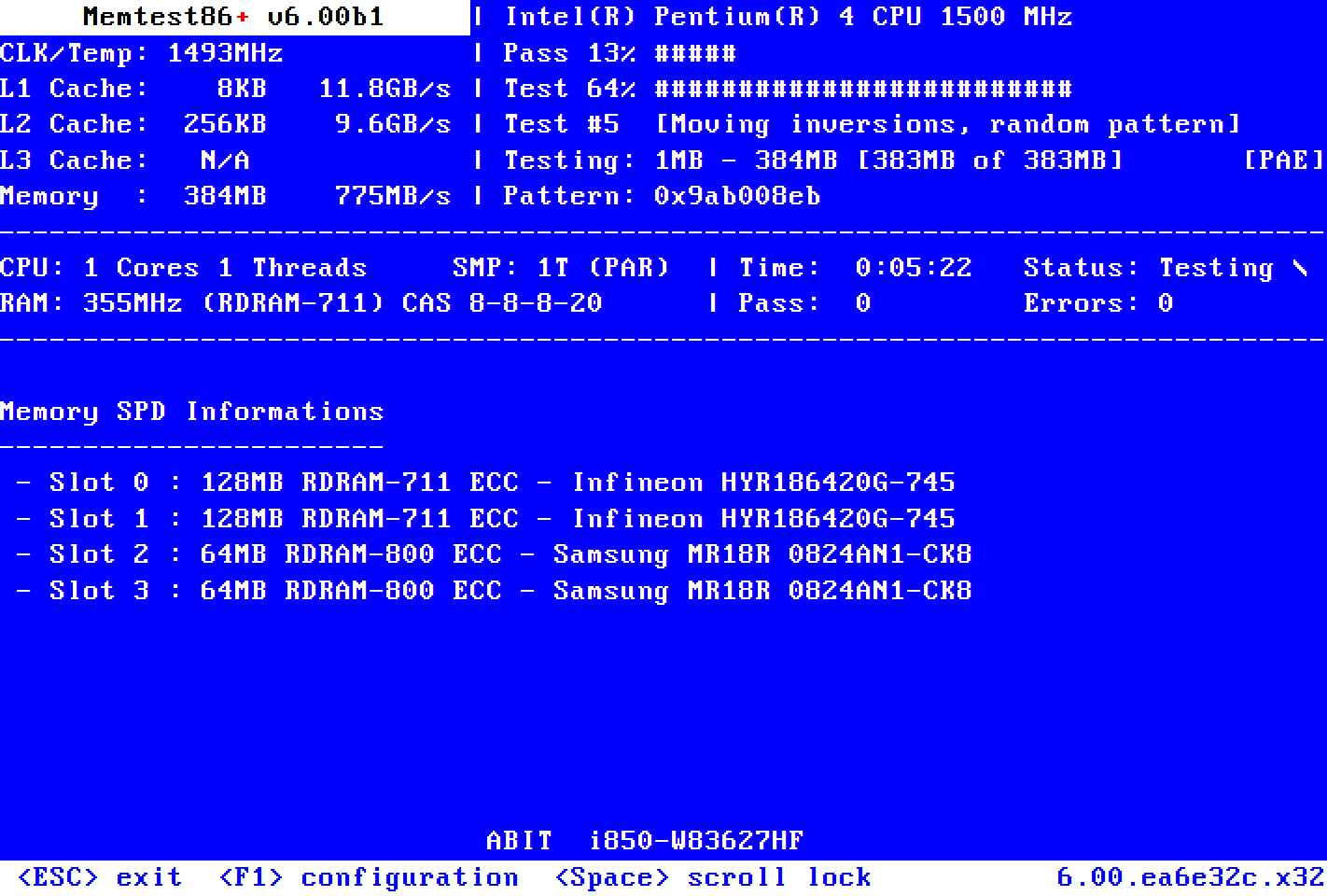Hey guys, I have 2x8GB 3200mhz of Corsair Vengeance Pro ram and 2x8GB 3200mhz of Hyper X Fury ram and I put all of them in my MOBO and the ram speed is stuck at 2133MHZ, when I try to change it via BIOS (XMP or manual dram settings) it just restarts and defaults back to 2133mhz speed again. I figured since the ram actually works together it should be able to run at 3200mhz too? Thanks in advance!
Question Mixing different brand but same speed ram
- Thread starter xVFallen_KingVx
- Start date
You are using an out of date browser. It may not display this or other websites correctly.
You should upgrade or use an alternative browser.
You should upgrade or use an alternative browser.
Roland Of Gilead
Titan
Hey there,
We'll all say the same thing: Mixing ram is not a good idea. If perhaps, you're happy to trick around in the bios, then it's possible to get them to work.
The default speed when ram is not a kit, will be 2133/2400. You can play around the bios, set just the primary timings leaving all else on auto and see if it boots art 3200mhz. Chances are not great though.
Otherwise, RMA and put together 2 x 16 rig. Save any headaches.
We'll all say the same thing: Mixing ram is not a good idea. If perhaps, you're happy to trick around in the bios, then it's possible to get them to work.
The default speed when ram is not a kit, will be 2133/2400. You can play around the bios, set just the primary timings leaving all else on auto and see if it boots art 3200mhz. Chances are not great though.
Otherwise, RMA and put together 2 x 16 rig. Save any headaches.
Hey, sorry if this might seem like a stupid question since I've never really tinkered with ram settings before, what are the primary timings? Thanks.Hey there,
We'll all say the same thing: Mixing ram is not a good idea. If perhaps, you're happy to trick around in the bios, then it's possible to get them to work.
The default speed when ram is not a kit, will be 2133/2400. You can play around the bios, set just the primary timings leaving all else on auto and see if it boots art 3200mhz. Chances are not great though.
Otherwise, RMA and put together 2 x 16 rig. Save any headaches.
geofelt
Titan
Ram is sold in kits for a reason.
A motherboard must manage all the ram using the same specs of voltage, cas and speed.
The internal workings are designed for the capacity of the kit.
Ram from the same vendor and part number can be made up of differing manufacturing components over time.
Some motherboards, particularly ryzen, can be very sensitive to this.
This is more difficult when more sticks are involved.
Ram must be matched for proper operation.
You can sometimes compensate for errors by increasing the ram voltage in the motherboard bios if you have a motherboard that permits such settings.
A motherboard must manage all the ram using the same specs of voltage, cas and speed.
The internal workings are designed for the capacity of the kit.
Ram from the same vendor and part number can be made up of differing manufacturing components over time.
Some motherboards, particularly ryzen, can be very sensitive to this.
This is more difficult when more sticks are involved.
Ram must be matched for proper operation.
You can sometimes compensate for errors by increasing the ram voltage in the motherboard bios if you have a motherboard that permits such settings.
Hey, I appreciate the help, I switched my CPU from a 2600x to a 3600 and set the speed to 3200mhz in BIOS and all of a sudden it worked. Should I try XMP instead or is setting the speed manually good enough. It says 1599.6mhz in CPUz settings now so I think we're good.Ram is sold in kits for a reason.
A motherboard must manage all the ram using the same specs of voltage, cas and speed.
The internal workings are designed for the capacity of the kit.
Ram from the same vendor and part number can be made up of differing manufacturing components over time.
Some motherboards, particularly ryzen, can be very sensitive to this.
This is more difficult when more sticks are involved.
Ram must be matched for proper operation.
You can sometimes compensate for errors by increasing the ram voltage in the motherboard bios if you have a motherboard that permits such settings.
geofelt
Titan
I think you are good.
If you want to test for stability,
Run memtest86 or memtest86+
They boot from a usb stick and do not use windows.
You can download them here:


 www.memtest.org
If you can run a full pass with NO errors, your ram should be ok.
www.memtest.org
If you can run a full pass with NO errors, your ram should be ok.
Running several more passes will sometimes uncover an issue, but it takes more time.
Probably not worth it unless you really suspect a ram issue.
XMP is a set of ram settings embedded within the ram stick.
It specifies several profiles for different speeds and timings.
It should be no surprise that two different kits would have different xmp profiles, resulting in confusion and defaulting to minimum specs.
I think XMP is an intel term, but amd calls it something different.
By specifying speed ,voltage and other specs you have avoided such confusion.
If you want to test for stability,
Run memtest86 or memtest86+
They boot from a usb stick and do not use windows.
You can download them here:

MemTest86 - Official Site of the x86 Memory Testing Tool
MemTest86 is the original self booting memory testing software for x86 and ARM computers. Supporting both BIOS and UEFI, with options to boot from USB.
www.memtest86.com

Memtest86+ | The Open-Source Memory Testing Tool
Memtest86+ is an advanced, free, open-source, stand-alone memory tester for 32- and 64-bit computers (UEFI & BIOS supported)
Running several more passes will sometimes uncover an issue, but it takes more time.
Probably not worth it unless you really suspect a ram issue.
XMP is a set of ram settings embedded within the ram stick.
It specifies several profiles for different speeds and timings.
It should be no surprise that two different kits would have different xmp profiles, resulting in confusion and defaulting to minimum specs.
I think XMP is an intel term, but amd calls it something different.
By specifying speed ,voltage and other specs you have avoided such confusion.
Oh ok, I appreciate the explanation, it cleared up a lot for me. I'll run that mem test first thing in the morning. Have a good day/night!I think you are good.
If you want to test for stability,
Run memtest86 or memtest86+
They boot from a usb stick and do not use windows.
You can download them here:

MemTest86 - Official Site of the x86 Memory Testing Tool
MemTest86 is the original self booting memory testing software for x86 and ARM computers. Supporting both BIOS and UEFI, with options to boot from USB.www.memtest86.comIf you can run a full pass with NO errors, your ram should be ok.
Memtest86+ | The Open-Source Memory Testing Tool
Memtest86+ is an advanced, free, open-source, stand-alone memory tester for 32- and 64-bit computers (UEFI & BIOS supported)www.memtest.org
Running several more passes will sometimes uncover an issue, but it takes more time.
Probably not worth it unless you really suspect a ram issue.
XMP is a set of ram settings embedded within the ram stick.
It specifies several profiles for different speeds and timings.
It should be no surprise that two different kits would have different xmp profiles, resulting in confusion and defaulting to minimum specs.
I think XMP is an intel term, but amd calls it something different.
By specifying speed ,voltage and other specs you have avoided such confusion.
TRENDING THREADS
-
[SOLVED] Is it safe to use a recapped PSU for a long time ?
- Started by zwtch_17
- Replies: 5
-
Discussion What's your favourite video game you've been playing?
- Started by amdfangirl
- Replies: 3K
-
News Microsoft updates Windows 11 24H2 requirements, CPU must support SSE4.2 or the OS will not boot
- Started by Admin
- Replies: 19
-
Question User RX 580 8gb red devil powercolor, asking original BIOS
- Started by PizzaInGame
- Replies: 7
-
Latest posts
-
Question Daisy chaining fans without ARGB and left with one male connector
- Latest: Dampfkaessel
-
Question Where to find replacement ear pads for my headset ?
- Latest: ohio_buckeye
-
-
Question Nvidia RTX 4060 windows night light is reset constantly
- Latest: ohio_buckeye
-

Tom's Hardware is part of Future plc, an international media group and leading digital publisher. Visit our corporate site.
© Future Publishing Limited Quay House, The Ambury, Bath BA1 1UA. All rights reserved. England and Wales company registration number 2008885.

